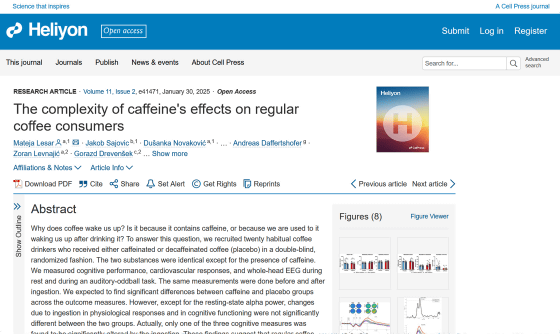Research shows that coffee drinkers can get similar benefits from decaffeinated coffee as from regular coffee

Many people drink coffee first thing in the morning or when they start to feel tired to get the energy they need to get through school or work. It is generally believed that the effects of coffee are largely due to the psychoactive
The complexity of caffeine's effects on regular coffee consumers: Heliyon
https://www.cell.com/heliyon/fulltext/S2405-8440(24)17502-0

Your Coffee May Not Even Need Caffeine to Wake You Up : ScienceAlert
https://www.sciencealert.com/your-coffee-may-not-even-need-caffeine-to-wake-you-up
New research shows decaf coffee can mimic caffeine's effects in habitual drinkers
https://www.psypost.org/new-research-shows-decaf-coffee-can-mimic-caffeines-effects-in-habitual-drinkers/
Coffee is an important drink loved by people all over the world, and is said to have various effects such as improving alertness and attention, increasing vitality, etc. It is generally believed that these effects are due to caffeine, but some researchers argue that other factors such as the aroma and taste of coffee, the expectation of drinking coffee itself, and conditioned reflexes also play a role.
'We wanted to understand what actually causes the physical and mental effects that people associate with coffee, especially among regular coffee drinkers,' said Mateja Lizar , a PhD student at the School of Informatics at Novo Mesto University in Slovenia. 'Is it the caffeine or the ritual of drinking coffee? There is clearly a ritualistic aspect to drinking coffee, but it's difficult to separate these effects from the caffeine.'
So, Riser and his team conducted an experiment in which subjects who were habitual coffee drinkers were given decaffeinated coffee and caffeinated decaffeinated coffee to measure various effects. Riser said, 'To explore this, we aimed to separate the effects of caffeine from the experience of drinking coffee by using decaffeinated coffee that looked, smelled, and tasted exactly like regular coffee. This allowed us to investigate the extent to which the response was driven by expectations and habits compared to the effects of caffeine.'

The research team recruited 20 healthy college students (10 men and 10 women) who habitually drink 1 to 3 cups of coffee per day. The subjects had slept for at least 7 hours before the experiment, had not drunk coffee for at least 8 to 11 hours, and had not eaten anything for 2 hours.
The subjects were assigned to either decaffeinated coffee or decaffeinated coffee with 6 mg of caffeine per kg of body weight, and were given measurements of their mental and physiological parameters before and after drinking the coffee. There was a 30-minute break between drinking the coffee and taking the measurements.
The subjects were not informed that the drink was decaffeinated coffee, and all subjects were convinced that they had drunk regular caffeinated coffee. It is reported that 6 mg of caffeine per kg of body weight is a fairly high dose, with up to 550 mg of caffeine administered.

The research team initially hypothesized that if caffeine is responsible for coffee's stimulating effect, subjects who consumed caffeinated coffee would show significant changes in cardiovascular, cognitive, and brain activity patterns compared to subjects who did not consume caffeinated coffee.
However, the results of the experiment showed that both groups of subjects showed almost the same physiological changes after consuming coffee. Measurements of blood pressure and heart rate showed that both groups showed a decrease in heart rate and an increase in blood pressure, which are typical responses to coffee. There was no significant difference between the two groups, regardless of whether they consumed caffeine or not.
Cognitive performance was also largely unaffected by caffeine: in a mental arithmetic task, subjects' accuracy and number of answers given did not change significantly before or after drinking either type of coffee. Meanwhile, reaction times in an auditory attention task improved slightly in both groups, but only the caffeine group saw a statistically significant improvement.
The results suggest that caffeine improved processing speed, but the fact that improvements were also seen in the caffeine-free group suggests that the 'expectations of drinking coffee' may have caused
The differences in brainwave patterns were even more pronounced between the caffeinated coffee and non-caffeinated coffee groups. When subjects' brainwave patterns were measured during cognitive tasks, both groups showed an increase in brainwave patterns associated with cognitive processing, but only the caffeinated group showed a statistically significant increase.
Resting brainwave patterns also differed depending on whether or not participants consumed caffeine, with reduced alpha wave activity observed in the caffeine group. Because reduced alpha wave activity is associated with increased attention and decreased inhibition, this result suggests that caffeine improved mental readiness.

Taken together, these results suggest that while caffeine did have a measurable effect on brain activity and reaction times, many of the physiological and psychological responses previously attributed to caffeine were also observed in the caffeine-free group.
'Our findings suggest that habitual coffee drinkers may experience a conditioned response regardless of whether or not the coffee contains caffeine,' Rizer told PsyPost. 'In other words, once you've become accustomed to consuming caffeine in a tasty cup of coffee, decaffeinated coffee can have roughly the same effect.'
Previous studies have shown that simply smelling the aroma of coffee can improve test results.
Just smelling the aroma of coffee can activate your brain - GIGAZINE

The study had limitations, including a small number of participants (only 20 people) and the lack of participants who did not regularly drink coffee. It's also possible that traces of caffeine or other bioactive compounds remaining in the decaffeinated beverage may have had an effect.
Future studies could learn more by including larger and more diverse participants, comparing regular coffee drinkers with non-coffee drinkers, or adding other control groups. 'We would like to further explore how participants' perceptions influence the effects of caffeine,' said Rizer.